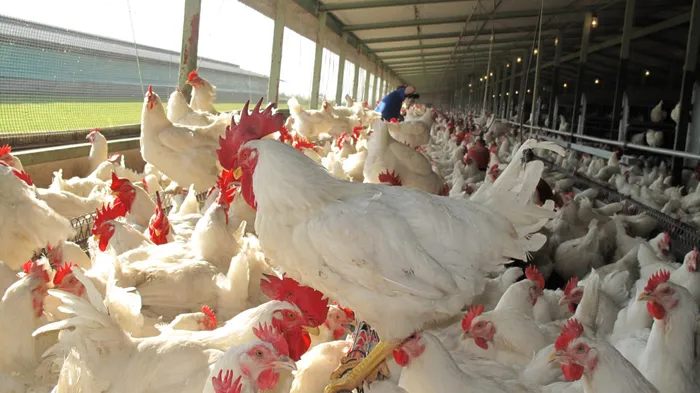South Africa faces poultry supply concerns amid Brazilian import ban
FOOD SECURITY

Farming associations and agricultural associations have raised concern about the impact of the Department of Agriculture’s ban on chicken from Brazil due to an avian influenza outbreak.
Image: supplied
South Africa is grappling with potential food insecurity this winter after the Department of Agriculture’s has banned chicken from Brazil due to an avian influenza outbreak.
The ban, effective since May 15, 2023, halts imports of live poultry, eggs, and fresh or frozen poultry meat, raising alarms over the supply of mechanically deboned meat (MDM) and poultry offal critical for affordable processed meats like polony, viennas, and sausages.
The Association of Meat Importers and Exporters warned on Wednesday of serious economic and food insecurity consequences for South Africa as a result of the recent outbreak of Avian Influenza (HPAI) in Brazil.
“Local producers cannot, and will not be able to meet the gap in supply of poultry offal (feet, gizzards, and skins) and MDM, driving up prices and threatening the affordability and accessibility of basic protein for millions,” it said.
Georg Southey, the manager at Merlog Foods, said on Wednesday said there is likely to be a shortage of 400 million meals per month, which equates to seven meals per person per month across the country. Two weeks of import shipments have already been wasted, and a further 100 million meals will be lost every week if the government continues with business as usual.
Southey added that the country has only 2.5 weeks of food reserves in some key categories. “This will have devastating consequences for food security and exacerbate a dreadful reality that estimates suggest over 30% of South African households in at least four provinces already have inadequate food and often go hungry,” he added.
Arnold Prinsloo, CEO of meat producer Eskort, noted that MDM from Brazil is used by Eskort and its competitors to make polony, viennas, Russians, and Braaiwors.
"Production lines will come to a standstill before the end of June if the ban on Brazilian chicken is not lifted. This will deprive South Africa’s most vulnerable citizens of more than 400 million low-cost meals per month,” he said.
Prinsloo added that vulnerable families and thousands of school feeding schemes rely heavily on polony, and there is a real danger of widespread hunger and malnutrition if Eskort and its competitors cannot sustain supplies. “The Department of Agriculture, which imposed the Brazil ban on 15 May, should follow the example of Namibia and Mozambique by narrowing the ban to chicken from Rio Grande do Sul, the only state affected by avian flu. The rest of Brazil can be regarded as safe, and a pragmatic and proactive decision to accept imports on that basis will go a long way to heading off the looming crisis in South Africa.”
However, Izaak Breitenbach, the CEO of the South African Poultry Association, offered a counterpoint, suggesting the impact on poultry meat supply may be overstated.
“South Africa imports a reduced volume of chicken meat from Brazil, and local production can ramp up quickly, especially as demand typically dips this time of year,” Breitenbach said. While acknowledging a shortage of MDM, which is predominantly imported from Brazil, he noted that South Africa produces minimal MDM domestically and may shift imports to countries like Thailand. “There will not be a shortage of chicken meat, but MDM supply will be constrained,” he clarified.
Investment analyst Anthony Clark from Smalltalkdaily Research said that America and Europe have also reported avian influenza outbreaks. “Brazil is the biggest exporter of poultry products into South Africa. They have a market share of around 80%, so it is concerning that there is a ban on their products. This means that there is very little chicken coming into this country. However, products that are coming in from Brazil are MDM which goes into processed meat such as polony, viennas, and Russians. The other products that are still coming in from Brazil are chicken offals such as carcasses, heads, and livers.”
Clark added that he believes if there was an exemption on heat-treated MDM continues to hold, “There should not be that much disruption in the underlying supply of affordable processed meat. We as a country do not produce enough MDM to cater for the demand for processed chicken meat.”
Mervyn Abrahams, programme co-ordinator at Pietermaritzburg Economic Justice and Dignity Group (PMBEJD), said that the decision to ban Brazilian poultry was an important one by the department because without such a move the health of many people would have been at stake. “We hope that the department has a proper monitoring mechanism to ensure that there is no unfair price increase on chicken as it is an important and more affordable source of protein for many families. Fish should not be seen as a substitute for chicken, but more as part of a regular supply of protein just like beans, as is the case in many households where the items form part of the normal diet.”
BUSINESS REPORT
Visit: www.businessreport.co.za